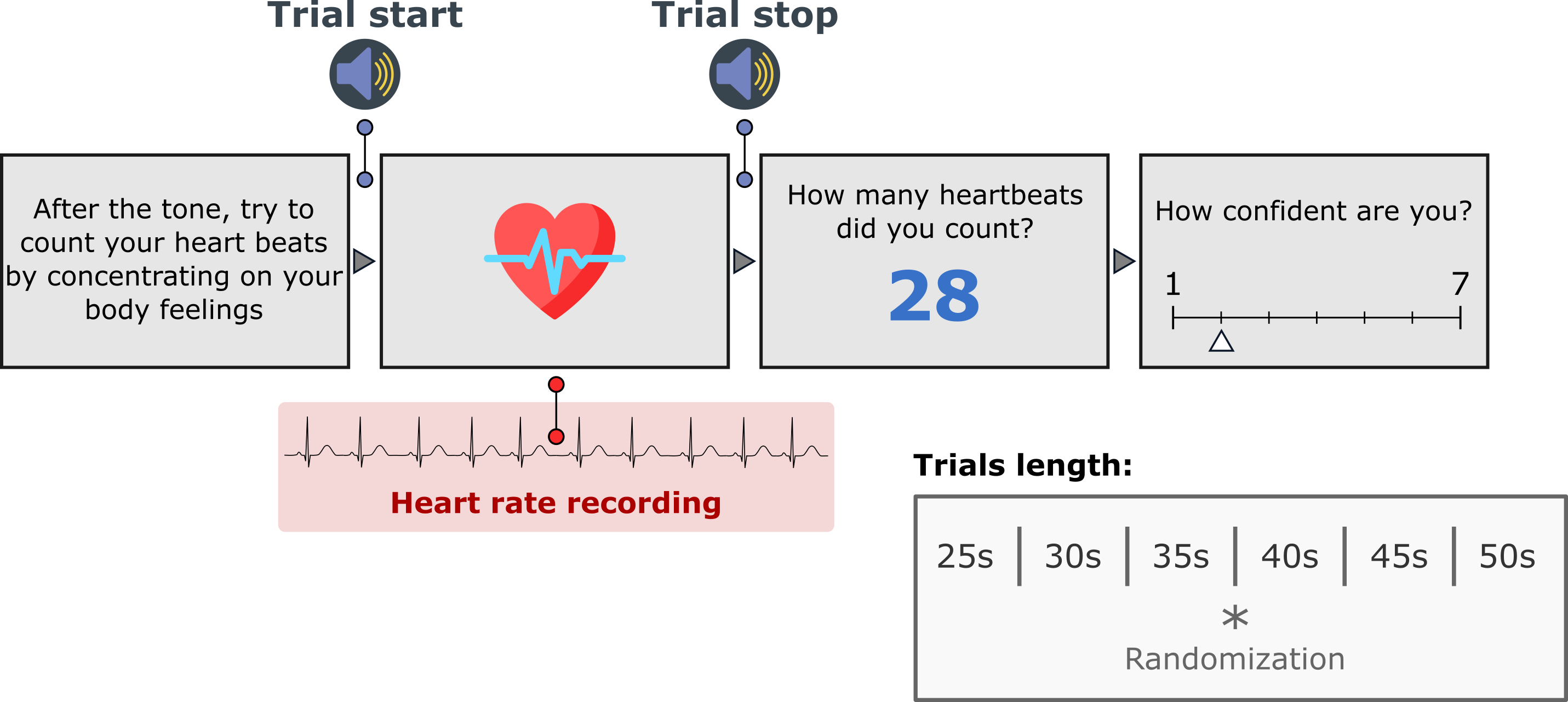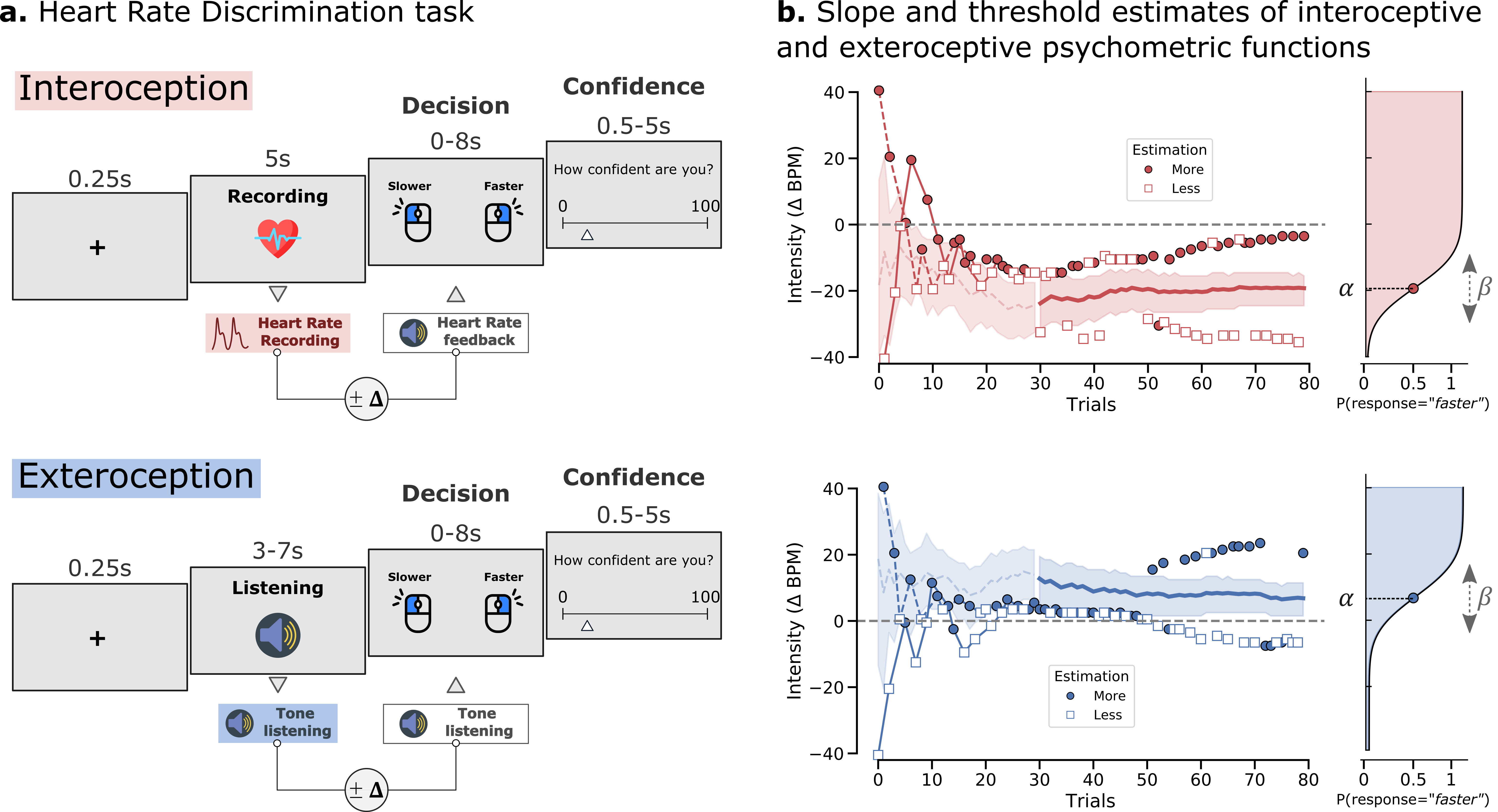The Cardioception Python Toolbox is a fork of the original cardioception repository that I (Nicolas Legrand) created while working in the ECG lab from 2019 to 2022. My previous lab has taken full control of the repository since then, meaning that I am unfortunately unable to maintain it as it should be. This repository allows me to pursue the maintenance of the package, aiming to provide reliable and robust tasks to measure cardiac interoception, together with computational modelling tools to analyse data gathered with these tasks.
The repository implements two measures of cardiac interoception (cardioception):
- The Heartbeat counting task developed by Rainer Schandry1,2. This task cardiac measures interoception by asking participants to count their heartbeats for a given period of time. An accuracy score is then derived by comparing the reported heartbeats and the true number of heartbeats.
- The Heart Rate Discrimination Task 3 implements an adaptive psychophysical measure of cardiac interoception where participants have to estimate the frequency of their heart rate by comparing it to tones that can be faster or slower. By manipulating the difference between the true heart rate and the presented tone using different staircase procedures, the bias (threshold) and precision (slope) of the psychometric function can be estimated either online or offline (see Analyses below), together with metacognitive efficiency.
These tasks can run using minimal experimental settings: a computer and a recording device to monitor the heart rate of the participant. The default version of the task uses the Nonin 3012LP Xpod USB pulse oximeter together with Nonin 8000SM 'soft-clip' fingertip sensors. This sensor can be plugged directly into the stim PC via USB and will work with Cardioception without any additional coding required. The tasks can also integrate easily with other recording devices and experimental settings (ECG, M/EEG, fMRI...).
The documentation can be found under the following link.
If you are using cardioception in a publication we ask you to cite the following paper:
Legrand, N., Nikolova, N., Correa, C., Brændholt, M., Stuckert, A., Kildahl, N., Vejlø, M., Fardo, F., & Allen, M. (2021). The Heart Rate Discrimination Task: A psychophysical method to estimate the accuracy and precision of interoceptive beliefs. Biological Psychology, 108239. https://doi.org/10.1016/j.biopsycho.2021.108239
If you are using systole to interact with your recording device (this is the default behaviour in cardioception), you might also cite the following reference:
Legrand et al., (2022). Systole: A Python package for cardiac signal synchrony and analysis. Journal of Open Source Software, 7(69), 3832, https://doi.org/10.21105/joss.03832
If you have questions regarding the tasks, want to report a bug or discuss data analysis, please ask on the public discussion page in this repository.
- The most recent version can be installed uing:
pip install cardioception - The current development branch can be installed using
pip install git+https://github.com/LegrandNico/Cardioception.git
The task can be installed in a new environment using the environment.yml file that you can find at the root of the directory. Using the Anaconda prompt, you can create a new environment with:
conda env create -f environment.yml
This will create a new cardioception environment that you can later activate using:
conda activate cardioception
Note: If you are using the shortcut method described below, you will have to activate the cardioception environment instead of the base one.
Cardioception has been tested with Python 3.7. We recommend using the last install of Anaconda for Python 3.7 or latest (see https://www.anaconda.com/products/individual#download-section).
Make sure that you have the following packages installed and up to date before running cardioception:
- psychopy can be installed with
pip install psychopy. - systole can be installed with
pip install systole.
The other main dependencies are:
In addition, some functions for HTML reports will require:
- papermill (>=2.3.1)
- matplotlib (>=3.3.3)
- seaborn (>=0.11.1)
- pingouin (>=0.3.10)
- metadpy (>=0.1.0)
- pymc (>=5.0)
NOTE The versions provided here are the ones used when testing and running cardioception locally and are often the last ones. For several packages, however, older versions might also be compatible.
Cardioception will automatically copy the images and sound files necessary to run the task correctly (~ 160 Mo). These files will be removed if you uninstall the package using pip uninstall cardioception.
Both the Heartbeat counting task (HBC) and the heart rate discrimination task (HRD) require access to a physiological recording device during the task to estimate the heart rate or count the number of heartbeats in a given time window. Cardioception natively supports:
- The Nonin 3012LP Xpod USB pulse oximeter together with Nonin 8000SM 'soft-clip' fingertip sensors
- Remote Data Access (RDA) via BrainVision Recorder together with Brain product ExG amplifier.
The package can easily be extended and integrate other recording devices by providing another recording class that will interface with your own devices (ECG, pulse oximeters, or any kind of recording that will offer precise estimation of the cardiac frequency).
Each task contains a parameters and a task submodule describing the experimental parameters and the Psychopy script respectively. Several changes and adaptations can be parametrized just by passing arguments to the getParameters function. Please refer to the API documentation for details.
Once the package has been installed, you can run the task (e.g. here the Heart rate Discrimination task) using the following code snippet:
from cardioception.HRD.parameters import getParameters
from cardioception.HRD import task
# Set global task parameters
parameters = parameters.getParameters(
participant='Subject_01', session='Test', serialPort=None,
setup='behavioral', nTrials=10, screenNb=0)
# Run task
task.run(parameters, confidenceRating=True, runTutorial=True)
parameters['win'].close()This minimal example will run the Heart Rate Discrimination task with a total of 10 trials using a Psi staircase.
We provide standard scripts in the wrappers folder that can be adapted to your needs. We recommend copying this script in your local task folder if you want to parametrize it to fit your needs. The tasks can then easily be executed by running the corresponding wrapper file (e.g. in a terminal).
Once you have adapted the scripts, you can create a shortcut (e.g. in the Desktop) so the task can be executed just by clicking on it without any coding or command line interactions.
If you are using Windows, you can simply create a .bat file containing the following:
call [path to your environment */conda.bat] activate
[path to your local */python.exe] [path to your wrapper */hrd.py]
pause
This module is an implementation of the classic "heartbeat counting task" (HCT)1,2 in which participants attend to their heartbeats in intervals of various lengths. Afterwards, the participant indicates the number of counted heartbeats, and a score is computed to represent their accuracy. In the original version1, the task started with a resting period of 60 seconds and consisted of three estimation sessions (25, 35, and 45 seconds) interleaved with resting periods of 30 seconds in the following order:
By default, this task implements the version used in recent publications 4 in which a training trial of 20 seconds is proposed, after which the 6 experimental trials of different time windows (25, 30, 35,40, 45 and 50s) occurred in a randomized order. The trial length, the condition ('Rest', 'Count', 'Training'), and the randomization can be controlled in the parameters dictionary.
This task implements an adaptive psychophysical procedure for estimating participants' ability to discriminate their heart rate. In each trial, participants attend to their heartbeat sensations for five seconds and estimate their average heart rate. Immediately following this period, a cardiac feedback stimulus of 5 tones is played at a particular BPM frequency. The frequency is determined as their estimated average BPM plus or minus an intensity value that is updated by an adaptive staircase procedure (up/down or psi).
The results are saved in the 'resultPath' folder defined in the parameters dictionary. For each task, we provide a comprehensive notebook detailing the main results, quality checks, and basic preprocessing steps. You can automatically generate the HTML reports using the following code snippet:
from cardioception.reports import report
resultPath = "./" # the folder containing the result files
reportPath = "./" # the folder where you want to save the HTML report
report(resultPath, reportPath, task='HRD')This code will generate the HTML reports for the Heart Rate Discrimination task in the reportPath folder using the results files located in resultPath. This will require papermill.
You can also analyze the results in Google Colab using one of the following links and upload the content of your result folder.
| Notebook | Colab | nbViewer |
|---|---|---|
| Heartbeat Counting task report | ||
| Heart Rate Discrimination task report |
More advanced subject and group-level Bayesian modelling approaches are described in the following notebooks.
| Notebook | Colab | nbViewer |
|---|---|---|
| Fitting the psychometric function (single subject) | ||
| Fitting the psychometric function (group level) |
- Dale, A., & Anderson, D. (1978). Information Variables in Voluntary Control and Classical Conditioning of Heart Rate: Field Dependence and Heart-Rate Perception. Perceptual and Motor Skills, 47(1), 79–85. https://doi.org/10.2466/pms.1978.47.1.79
- Schandry, R. (1981). Heart Beat Perception and Emotional Experience. Psychophysiology, 18(4), 483–488. https://doi.org/10.1111/j.1469-8986.1981.tb02486.x
- Legrand, N., Nikolova, N., Correa, C., Brændholt, M., Stuckert, A., Kildahl, N., Vejlø, M., Fardo, F., & Allen, M. (2022). The heart rate discrimination task: A psychophysical method to estimate the accuracy and precision of interoceptive beliefs. In Biological Psychology (Vol. 168, p. 108239). Elsevier BV. https://doi.org/10.1016/j.biopsycho.2021.108239
- Hart, N., McGowan, J., Minati, L., & Critchley, H. D. (2013). Emotional Regulation and Bodily Sensation: Interoceptive Awareness Is Intact in Borderline Personality Disorder. Journal of Personality Disorders, 27(4), 506–518. https://doi.org/10.1521/pedi_2012_26_049
This package is a fork of the original Cardioception repository and is maintained by Nicolas Legrand.
Some icons used in the Figures or presented during the tasks were downloaded from Flaticon www.flaticon.com.








